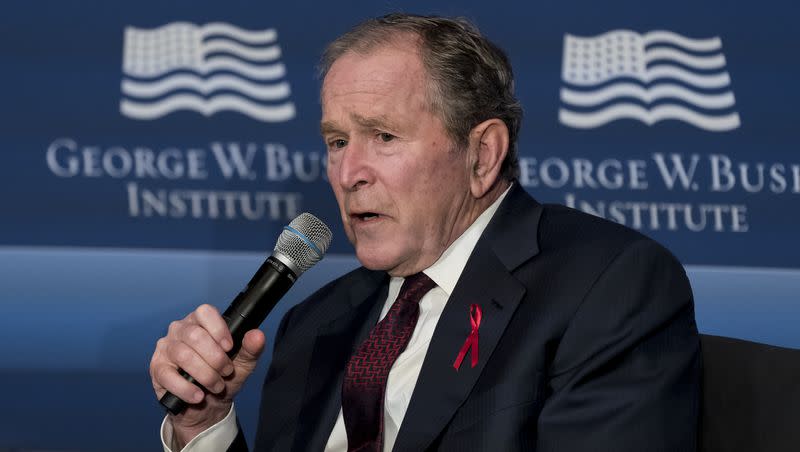Why George W. Bush believes AIDS relief program is in danger

- Oops!Something went wrong.Please try again later.
- Oops!Something went wrong.Please try again later.
“We are on the verge of ending the HIV/AIDS epidemic. To abandon our commitment now would forfeit two decades of unimaginable progress and raise further questions about the worth of America’s word.”
Former President George W. Bush penned an opinion piece for The Washington Post, writing about the program that has saved more than 25 million lives: PEPFAR, or the President’s Emergency Plan for AIDS Relief. The program passed through Congress in 2003, with “huge bipartisan support” and has allowed the world to be close to ending deaths from AIDS by 2030.
Related
Bush and several of his senior advisers, including Condoleezza Rice and Mike Gerson, encouraged him to act “before an entire generation was lost.” Gerson, now deceased, shared a memory of being in Africa in 2005, at the peak of the AIDS epidemic.
“A memory from the AIDS crisis. It was 2005, the year that global AIDS deaths peaked at 2.3 million. At the end of a dirt road in Kericho, Kenya, I visited Sister Placida, an energetic nun caring for a few dozen equally energetic AIDS orphans. She showed me several ‘memory boxes’ that dying mothers had prepared for their children, holding photos, letters, a few mementos. The exercise struck me as forlorn — a short life poured into a shoebox — but also as defiant. Facing an absurd death sentence, these women wanted to be recalled not as victims but as humans. They wanted to leave a mark, to make a statement: Once there was such a life as mine.”
PEPFAR’s website says it is the “largest commitment by any nation to address a single disease in history, enabled by strong bipartisan support across 10 U.S. congresses and four presidential administrations, and through the American people’s generosity.”
Since its inception 20 years ago, it has become one of the “most successful global health programs in modern history,” The New York Times reported. The number of people on lifesaving treatment multiplied by 300 times, from 66,500 in 2004 to more than 20 million people in 54 countries in 2022.
In addition to saving 25 million lives, 5.5 million babies have been born HIV-free under PEPFAR’s programs. There are still countries with high rates of mother-to-child-transmission of the virus, however. An estimated 130,000 children were newly infected with HIV in 2022. PEPFAR’s newest initiative — subject to funding — is “Safe Births, Healthy Babies,” specifically aimed at significantly decreasing, and then eliminating maternal transmission in high-transmission countries.
Funding at risk
PEPFAR authorization expires on Sept. 30, and the program that once had strong bipartisan support through multiple presidencies, including former President Donald Trump’s, has gotten tangled in partisan politics.
Abortion opponents believe that the Biden administration is secretly planning to use PEPFAR to promote abortion overseas. During the original debates on the proposed bill in 2003, pro-life legislators praised the bill and encouraged others to support it. Two of those legislators included Henry Hyde, the sponsor of the Hyde Amendment that bars the use of federal funds to pay for abortion, and Dave Weldon, who sponsored the Weldon Amendment that allows insurers to refuse to pay for abortion. There is no evidence that PEPFAR funds have ever been used to pay for international abortions, reports The New York Times.
In a report from last year, “Reimagining PEPFAR’s Strategic Direction,” the organization explicitly states “PEPFAR does not fund abortions, consistent with longstanding legal restrictions on the use of foreign assistance funding related to abortion.”
Nevertheless, PEPFAR reauthorization is now facing a steep climb. Three influential outside groups that oppose abortion — the Family Research Council, the Heritage Foundation’s political action arm and Susan B. Anthony Pro-Life America intend to “score” the PEPFAR vote when they compile their annual ratings of members of Congress. A vote for renewing PEPFAR without the anti-abortion language would be counted as a demerit, making it politically toxic for most Republicans, The New York Times reported earlier this summer.
At least one member of the Utah federal delegation, Sen. Mitt Romney, supports the reauthorization of PEPFAR. In a joint letter with multiple senators of both major parties, as well as one independent senator, Romney and colleagues “enthusiastically endorse PEPFAR reauthorization.”
“The success that PEPFAR should have with implementing such a maternal care program will extend beyond the lives saved and pain ameliorated among African women and children. It will be strategically important to the United States. Forty percent of the world’s population will be African by the end of the century and our strategic competitors are investing comprehensively in the region. We know that the PEPFAR program remains one of our most potent soft power assets on this front,” concluded the senators.
Holly Richardson is the editor of Utah Policy

